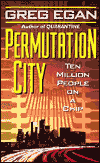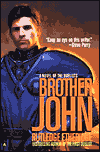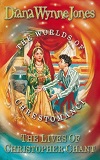
Dr. Futurity, by Philip K. Dick
Book Review by C. Dennis Moore
Have you read this book?
When you talk about science fiction, there are a few names that always come up. There's Ray Bradbury, of course, Isaac Asimov, Philip K. Dick (you could throw Harlan Ellison in there, too, but after reading his 1100-plus-page collection THE ESSENTIAL ELLISON, it's obvious there is no categorizing Ellison). These guys are the mack daddies, the top dogs, the OGs of science fiction. Philip K. Dick (1928-1982) never made much of a mark during his life, and it's only been since his death that his work has achieved the level of renown it has, turning up on university curricula of modern American Literature. Starting with the 1982 adaptation of his novel DO ANDROIDS DREAM OF ELECTRIC SHEEP? into the movie BLADE RUNNER, Dick's work has been steadily adapted to film at a rate of roughly one movie every three years (MINORITY REPORT, IMPOSTER, PAYCHECK, and TOTAL RECALL among them). But I'd never read any of his work.
Contrary to popular belief I like to try new things every now and again, so when I saw a Dick novel on a list of books to review, I took it. I'm glad I finally got to experience this author's work. I'll probably try another one sooner or later.
In Dr. Futurity, Jim Parsons is getting his bearings after his car wrecks on the highway, only to look around and realize he's not in his world anymore. Somehow, whether the wreck resulted in his displacement or the shift caused his wreck, he's found himself 400 years in the future. Parsons accepts this a little too easily, I felt, and begins to plan his return, studying the people he encounters, studying their language, their appearance, all the while thinking his profession--he's a doctor--is one that will make him readily accepted in this new world until he can figure out how to get back to his own time. After all, there's always a demand for doctors.
Except in the year 2405, that is.
Parsons has found himself in a society where death is welcomed, sought after even, and saving the life of one who is on the verge of death is illegal and will end with the criminal being sent off to the Martian prison colony.
Parsons is horrified to find these people actually WANT to die, that his skills and training aren't wanted, are hated even, until he has this new world explained to him in better detail.
"We keep a constant population. Roughly, two and three-quarter billion. Each death automatically starts a new zygote from cold-pack along its regular developmental path. For each death there is an instantaneous new life; the two are interwoven."
Parsons thought, So out of death comes life. In their view, death is the cause of life.
"Where do the zygotes come from?" he inquired.
"Contributed according to a specific and very complex pattern. Each year we have Lists. Contest examinations between the tribes. Tests that cover all phases of ability, physical fitness, mental faculties, and intuitive functioning at every level and of every description and orientation. From the most abstract to the object-correlatives, the manual skills."
With comprehension, Parsons said, "The contribution of gametes is proportional to the test ratings of each tribe."
Stenog nodded. "In the last Lists the Wolf Tribe gained sixty victories out of two hundred. Therefore it contributed thirty percent of the zygotes for the next period, more than the three next highest-scoring tribes. As many gametes as possible are taken from the actual high-scoring men and women. The zygotes are always formed here, of course. Unauthorized zygote formation is illegal . . . . but I don't want to offend your sensibilities. Extremely talented persons have made substantial contributions, even where their particular tribes have scored low. Once a gifted individual is located, all efforts are made to obtain his or her total supply of gametes. The Mother Superior of the Wolf Tribe, for example. None of Loris' gametes are lost. Each is removed as it is formed and immediately impregnated at the Fountain. Inferior gametes, the seed of low-scores, are ignored and allowed to perish."
Now, with first real clarity, Parsons grasped the underlying scheme of this world. "Then your stock is always improving . . . And the girl, Icara. She wanted to die because she was maimed, disfigured. She knew she would have had to complete the Lists that way."
"She would have been a negative factor. She was what we call substandard. Her tribe would have been pulled down by her entry. But as soon as she was dead, a superior zygote, from a later stock than her own, was released."
I thought this was a pretty cool idea for a society and was very interested in seeing where PKD went with it. But then, a few chapters later, everything changed. Parsons is sent to the Martian prison colony, but his transport is intercepted by a group of people who, I thought, were simply trying to change the rules of their society and, instead of embracing death, wanted to enjoy life. One of the tribe leaders has been dead for thirty-five years, but his tribe has kept him in stasis that entire time until they can find someone capable of reviving him. They've chosen Parsons--they're the ones responsible for bringing him into the future--and as a doctor, he feels obligated to do what he does, save lives.
Then out of nowhere, it seemed the original premise for this novel was abandoned and things just got a little confusing. Parsons is brought from the past to save this life because this man, Corith, once went back to the 1500s in order to kill the explorer Drake so the English wouldn't settle in the Americas and the Native tribes there would be the dominant race. But Corith was shot with an arrow and he's been "on ice" ever since. Parsons operates, saves him, but before he can wake up, Corith is killed with an arrow to the chest AGAIN. His family has gone back into the past a couple times already to try to stop his original death from happening, but so far have had no luck. And now he's killed again. Someone REALLY doesn't want this guy to live (now, if his family is able to travel back in time with such precision, why didn't they just travel back to the day Corith originally went back in time and tell him if he left he'd die in the past?).
Maybe this wasn't the right PKD novel to start with. I enjoyed it, sure, I read with interest, wanting to see what happened next, but a few times I got lost trying to follow the time travel logic (I'm still not convinced the plot is a solid one). And at least twice I had to go back two pages and start over because there was something that happened so subtly I didn't notice it at first.
I felt for Parsons--imagine leaving for work one morning, wrecking your car, and finding yourself in a world where your first instinct in a situation puts you on a transport to a prison colony on another planet!--but wasn't entirely convinced by the way he seemed to stay calm and in control.
The other characters all seemed a little sci-fi soap opera cliche to me, but that might just be a matter of perspective. I mean, this novel was first published in 1960 and, like I said, Dick is one of the forefathers of the genre, so naturally what we see as cliche today probably started with him and was an original idea 50 years ago.
The ending I was highly satisfied with, however. The last two chapters, saw everything wrapped up nicely and brought back around to the original premise of the society based around the acceptance of death.
Dr. Futurity might not have been the right novel to start with, but it did give me a taste of what the author's all about and I'm sure I'll be reading more of his work in the future.
Contrary to popular belief I like to try new things every now and again, so when I saw a Dick novel on a list of books to review, I took it. I'm glad I finally got to experience this author's work. I'll probably try another one sooner or later.
In Dr. Futurity, Jim Parsons is getting his bearings after his car wrecks on the highway, only to look around and realize he's not in his world anymore. Somehow, whether the wreck resulted in his displacement or the shift caused his wreck, he's found himself 400 years in the future. Parsons accepts this a little too easily, I felt, and begins to plan his return, studying the people he encounters, studying their language, their appearance, all the while thinking his profession--he's a doctor--is one that will make him readily accepted in this new world until he can figure out how to get back to his own time. After all, there's always a demand for doctors.
Except in the year 2405, that is.
Parsons has found himself in a society where death is welcomed, sought after even, and saving the life of one who is on the verge of death is illegal and will end with the criminal being sent off to the Martian prison colony.
Parsons is horrified to find these people actually WANT to die, that his skills and training aren't wanted, are hated even, until he has this new world explained to him in better detail.
"We keep a constant population. Roughly, two and three-quarter billion. Each death automatically starts a new zygote from cold-pack along its regular developmental path. For each death there is an instantaneous new life; the two are interwoven."
Parsons thought, So out of death comes life. In their view, death is the cause of life.
"Where do the zygotes come from?" he inquired.
"Contributed according to a specific and very complex pattern. Each year we have Lists. Contest examinations between the tribes. Tests that cover all phases of ability, physical fitness, mental faculties, and intuitive functioning at every level and of every description and orientation. From the most abstract to the object-correlatives, the manual skills."
With comprehension, Parsons said, "The contribution of gametes is proportional to the test ratings of each tribe."
Stenog nodded. "In the last Lists the Wolf Tribe gained sixty victories out of two hundred. Therefore it contributed thirty percent of the zygotes for the next period, more than the three next highest-scoring tribes. As many gametes as possible are taken from the actual high-scoring men and women. The zygotes are always formed here, of course. Unauthorized zygote formation is illegal . . . . but I don't want to offend your sensibilities. Extremely talented persons have made substantial contributions, even where their particular tribes have scored low. Once a gifted individual is located, all efforts are made to obtain his or her total supply of gametes. The Mother Superior of the Wolf Tribe, for example. None of Loris' gametes are lost. Each is removed as it is formed and immediately impregnated at the Fountain. Inferior gametes, the seed of low-scores, are ignored and allowed to perish."
Now, with first real clarity, Parsons grasped the underlying scheme of this world. "Then your stock is always improving . . . And the girl, Icara. She wanted to die because she was maimed, disfigured. She knew she would have had to complete the Lists that way."
"She would have been a negative factor. She was what we call substandard. Her tribe would have been pulled down by her entry. But as soon as she was dead, a superior zygote, from a later stock than her own, was released."
I thought this was a pretty cool idea for a society and was very interested in seeing where PKD went with it. But then, a few chapters later, everything changed. Parsons is sent to the Martian prison colony, but his transport is intercepted by a group of people who, I thought, were simply trying to change the rules of their society and, instead of embracing death, wanted to enjoy life. One of the tribe leaders has been dead for thirty-five years, but his tribe has kept him in stasis that entire time until they can find someone capable of reviving him. They've chosen Parsons--they're the ones responsible for bringing him into the future--and as a doctor, he feels obligated to do what he does, save lives.
Then out of nowhere, it seemed the original premise for this novel was abandoned and things just got a little confusing. Parsons is brought from the past to save this life because this man, Corith, once went back to the 1500s in order to kill the explorer Drake so the English wouldn't settle in the Americas and the Native tribes there would be the dominant race. But Corith was shot with an arrow and he's been "on ice" ever since. Parsons operates, saves him, but before he can wake up, Corith is killed with an arrow to the chest AGAIN. His family has gone back into the past a couple times already to try to stop his original death from happening, but so far have had no luck. And now he's killed again. Someone REALLY doesn't want this guy to live (now, if his family is able to travel back in time with such precision, why didn't they just travel back to the day Corith originally went back in time and tell him if he left he'd die in the past?).
Maybe this wasn't the right PKD novel to start with. I enjoyed it, sure, I read with interest, wanting to see what happened next, but a few times I got lost trying to follow the time travel logic (I'm still not convinced the plot is a solid one). And at least twice I had to go back two pages and start over because there was something that happened so subtly I didn't notice it at first.
I felt for Parsons--imagine leaving for work one morning, wrecking your car, and finding yourself in a world where your first instinct in a situation puts you on a transport to a prison colony on another planet!--but wasn't entirely convinced by the way he seemed to stay calm and in control.
The other characters all seemed a little sci-fi soap opera cliche to me, but that might just be a matter of perspective. I mean, this novel was first published in 1960 and, like I said, Dick is one of the forefathers of the genre, so naturally what we see as cliche today probably started with him and was an original idea 50 years ago.
The ending I was highly satisfied with, however. The last two chapters, saw everything wrapped up nicely and brought back around to the original premise of the society based around the acceptance of death.
Dr. Futurity might not have been the right novel to start with, but it did give me a taste of what the author's all about and I'm sure I'll be reading more of his work in the future.
|
Click here to buy Dr. Futurity, by Philip K. Dick on Amazon
|
Dr. Futurity, by Philip K. Dick on Amazon

| More Books You Might Like |
Comment on Dr. Futurity, by Philip K. Dick
| Comments on Dr. Futurity, by Philip K. Dick |
| There are no comments on this book. |




